First Doctoral Cohort of Antiracist Changemakers
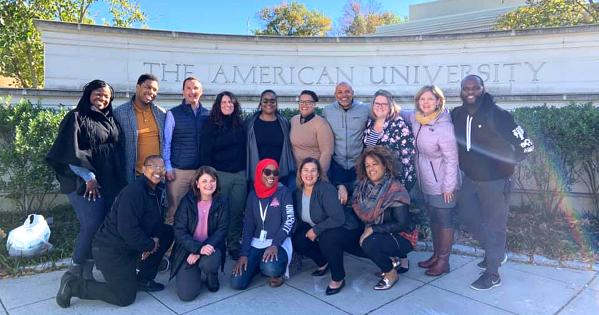
Believed to be one of the first of its kind to focus on antiracism, the “practice-oriented” doctoral program in education policy and leadership launched in August of 2019. It offers aspiring education leaders a pathway to disrupting and transforming U.S. education systems. Of the degree’s inception, associate dean Dr. Corbin Campbell said, “Antiracism and social justice were woven into every course from the start. Some schools have a course or two or developed a curriculum later, but I think we were the first.”
“It was an important moment in history to center practice with an antiracist lens,” said Dr. Samantha Cohen, executive director of the EdD program and senior professorial lecturer who leads the program with assistant director of doctoral programs, Anselm Beach. “For far too long, K-12 education has looked the same—moving along the student in the middle, or the student who could easily be successful within the system. We have a moral obligation to ensure all students, particularly students of color, can choose the future they want to pursue.” The second cohort completed their graduation requirements in August to commence in December, and the program currently has 85 educators enrolled, with 32 students beginning in the fall.
The program recruits educators—already excelling in their communities—who desire an opportunity to “re-think” schooling and leadership practices, and to intentionally embed antiracist learning into all learning experiences for students. The first cohort of 15 became more of a family than the participants ever expected, though they hail from different parts of the U.S.
“These students signed up for an inaugural program, knowing it would grow and evolve,” said Cohen. “They took responsibility to pave the way for decades of educators behind them.” While COVID-19 impacted the world, the students responded to racial injustices throughout the country and focused on antiracist topics for their dissertations.
The first cohort shared their thoughts on the program and goals for the future.
Dr. Jacques Patterson was inspired to seek a position on the D.C. State Board of Education. “The program helped me analyze the problems that underserved and marginalized families face in accessing quality education. And because I approached each problem from a scholar-activist perspective, it made the difference on Election Day and played a huge role in my victory."
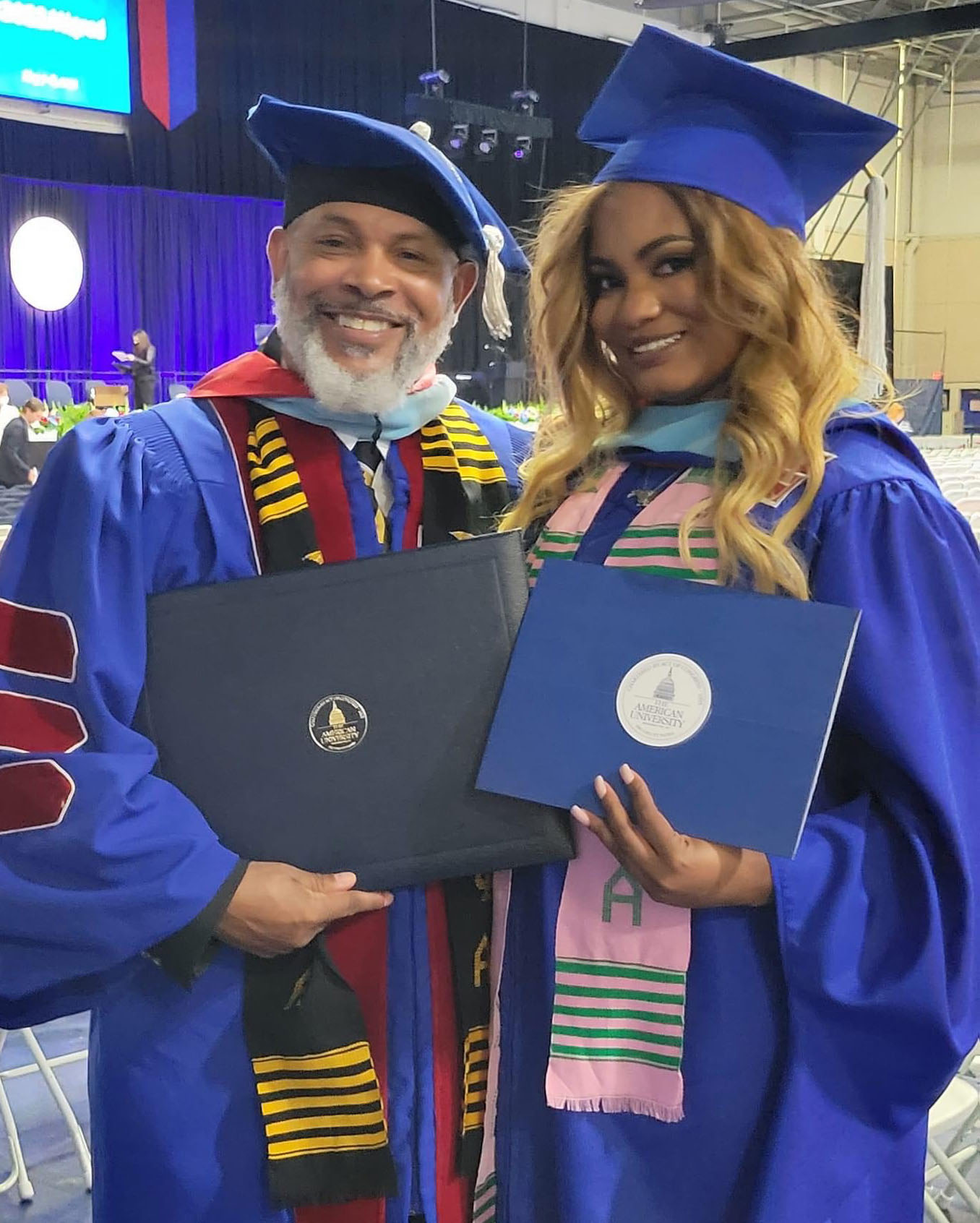 An AU family, Jacques’ daughter Jacquelyn graduated with her master’s in education the same day he received his doctorate. Jacquelyn reflected, “Matriculating in our respective programs further connected my father and me. We utilized one another—as editors of papers, and technology support—but most importantly as motivators.”
An AU family, Jacques’ daughter Jacquelyn graduated with her master’s in education the same day he received his doctorate. Jacquelyn reflected, “Matriculating in our respective programs further connected my father and me. We utilized one another—as editors of papers, and technology support—but most importantly as motivators.”
With a younger family to balance with coursework, Dr. Allison Kimble-Cusano found it challenging to also focus on her three young children. “I was a mother or a scholar-practitioner, but never both simultaneously,” she said. She discovered scholars who challenged her views. “I was empowered to explore research questions that I had previously discarded. I embraced my identity as a mother and focused my research on the role White liberal mothers play in their children's racial-ethnic socialization.”
They shared a collective mission from the first time the cohort met for their residency in person in October 2019. Cohen said they experienced an “… amazing intersection of deep learning, but also feeling as though there’s a communal, family feeling. Feelings of love and appreciation have grown because they cared for and embodied antiracism already. They had shown up with their real voices, whether they agreed or didn’t agree.” Meeting that first time, Dr. Jarvis P. Gause told a heartfelt story and asked how many in the cohort had Black educators in their life. Two-thirds had none, which compelled him to create an affinity space for Black male educators throughout the country. Using this experience, his dissertation was based on a qualitative research study exploring the role of affinity seminars on the personal and professional development of Black male educators.
“I learned from each one of their perspectives,” said Dr. Shayna Cook, crediting fellow cohort members with teaching her through conversations inside and outside of class. “Our cohort is comprised of people who have a deep dedication to creating equitable outcomes for all families, children, and educators by working tirelessly toward creating education systems driven by antiracist policies and practices—not from the Ivory Tower, but in deep partnership with and service to the community.” After graduation, Cook will continue to work as the Director of Early Childhood Systems at the Bainum Family Foundation as well as serving as a Senior Advisor in the Office of Early Childhood Development, Administration for Children and Families at the US Department of Health and Human Services.
Dr. Sonya Hunte began in the program just a month after becoming the inaugural senior director of the Anchorage (Alaska) School District’s Office of Equity and Compliance. “This program has provided in-depth learning on the educational system; historical perspectives on diverse student experiences; and a safe place to share practice approaches with professors, special guests, and cohort members.” She added: “I served as a panelist for the Discovery Education Network’s Equity Talk and my cohort showed up and cheered me on!”
Dr. Marisa Mendonsa fulfilled a long-term goal to return to teach at her high school. “It wasn’t until my 25th year of education that I found myself back in my hometown in the role of Deputy Superintendent,” she said, after her cohort helped her prepare to interview for the job. “As a White, queer woman, I can now step into this work by owning my bias, calling out racism, and implementing policy and structures that will fight to dismantle the historic racism public schools are often plagued by.”
Mendonsa and Dr. Brian Reilly built a strong connection as administrators working together in Massachusetts public schools. Following coursework on making disruption the norm, they presented a combined dissertation. “Together, we designed a research process that asked deep questions utilizing a two-person interview method to have discussions with our interviewees that allowed them to open up more than they would have in a formal one-on-one interview setting. Cohen and the SOE have developed a strong, practitioner-based program that builds an online community that is just as close as an on-campus program,” Reilly said.
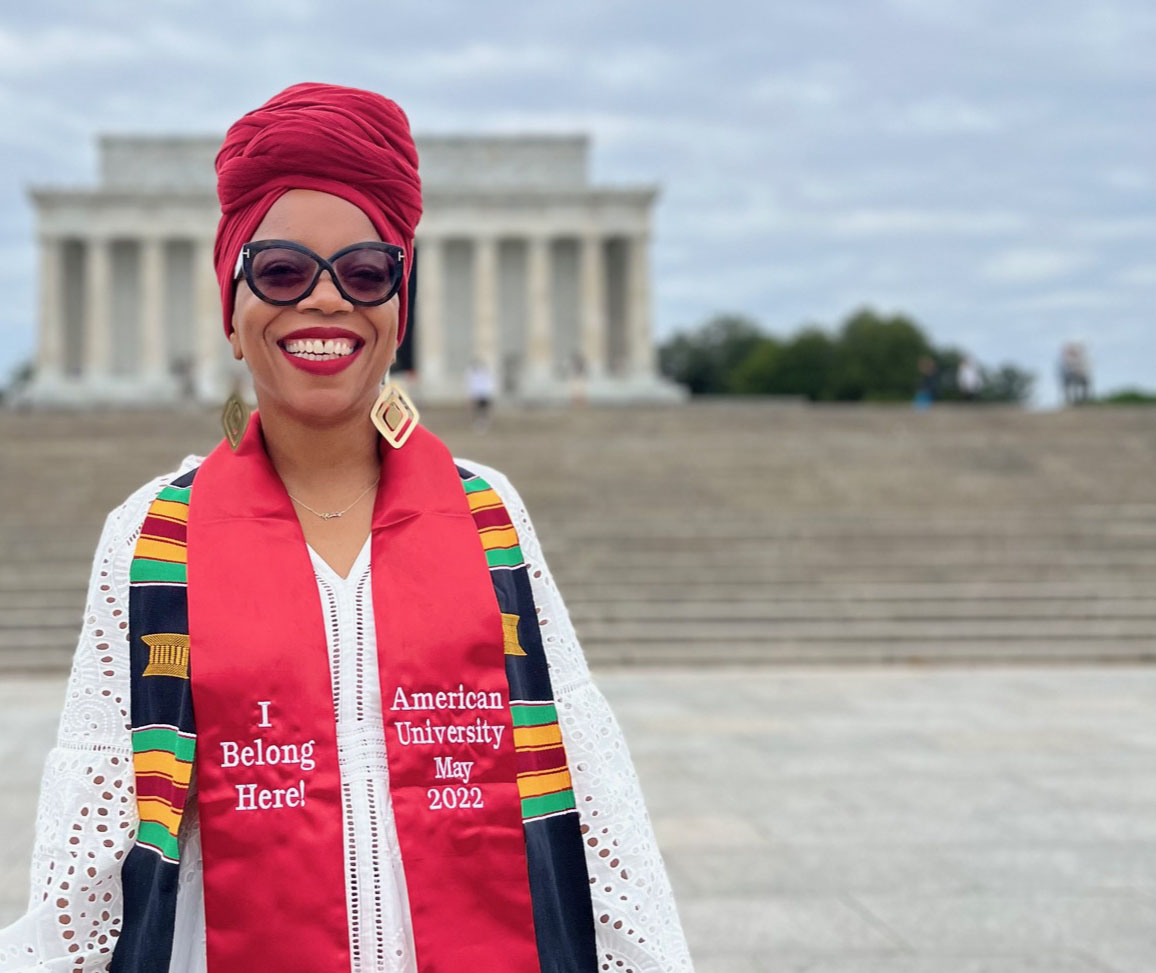 A ‘double AU eagle,’ Dr. Tomiko Ball completed her master’s in elementary education at AU. “I came to the doctoral program initially because I had a great experience and outcome from the master’s program, but also because AU had developed an antiracist center.” Ball remembered. “I honestly see this program as an exemplar of what other institutions can do—both predominately white institutions and Historically Black Colleges and Universities. We have done our part to center antiracism, wellbeing, and pushing against historical barriers.”
A ‘double AU eagle,’ Dr. Tomiko Ball completed her master’s in elementary education at AU. “I came to the doctoral program initially because I had a great experience and outcome from the master’s program, but also because AU had developed an antiracist center.” Ball remembered. “I honestly see this program as an exemplar of what other institutions can do—both predominately white institutions and Historically Black Colleges and Universities. We have done our part to center antiracism, wellbeing, and pushing against historical barriers.”
Dr. Cheyenne E. Batista owned an education consulting practice, Firefly Worldwide Inc., where she is a strategy consultant and executive coach. Through her coursework she found that she was “more able to leverage that unique meeting place between theory and practice and translate those understandings into tangible, transformative actions among the phenomenal leaders with whom I work.”
Dr. Desmond Rudd moved from Buffalo, NY, to work for the Washington, DC Office of the State Superintendent of Education as a Student Advocate Fellow. “The cognitive discourse I experienced in the Systems Thinking course centered on equity and antiracism compelled me to come to grips with my own biases, privileges, and other forms of White supremacy cultural norms and values I had subconsciously adopted and practiced within education,” he said.
Worried about the obstacles to opening a STEM school for girls, Dr. Dia. L. Jones got encouragement from Dr. Annice Fisher, SOE Antiracist Pedagogy Scholar. This support made her “recognize the impact of students having a future career in STEM. As a Black woman, I also see too few women of color in STEM ecosystems. My doctoral journey, along with my transformative study of the social and emotional needs of Black girls in STEM, has only increased my drive to open a STEM school for girls.”
For her research, Dr. Sherri Travers re-engaged with former students, now adults. “These young adults were willing to revisit systems thinking and learn about conscious leadership,” Travers said. “They then made deliberate decisions about how they would use the combination of systems thinking, which looks at external systems, alongside conscious leadership, which examines internal systems. They openly shared how this synergy of approaches affected their thinking and resulting actions, and how it prepared them to navigate this complex world. This is exactly what the world needs to achieve equity and antiracism.”
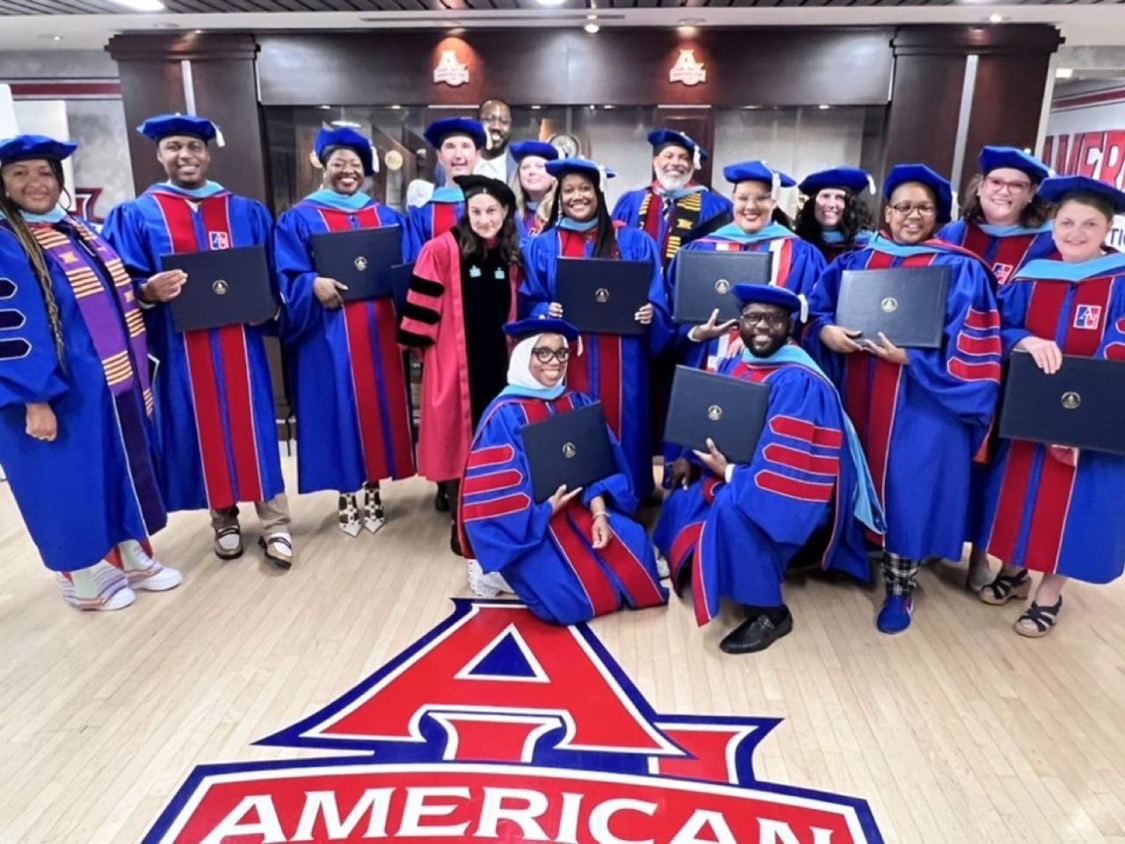
Working at Waterford, which makes an online curriculum to prepare children for literacy readiness, Dr. Jennifer Torres pushes her workplace to embody equity and diversity. “Waterford is creating the space for curriculum creators to question biases and use stories, activities, illustrations, and lessons to both build literacy skills and shift deficit-based narratives that are pervasive throughout the curriculum,” Torres said. “My work as a leader focuses on creating projects that push the team to continually question, learn together, and iteratively refine our shared understanding of what excellence looks like for all of our earliest learners.”
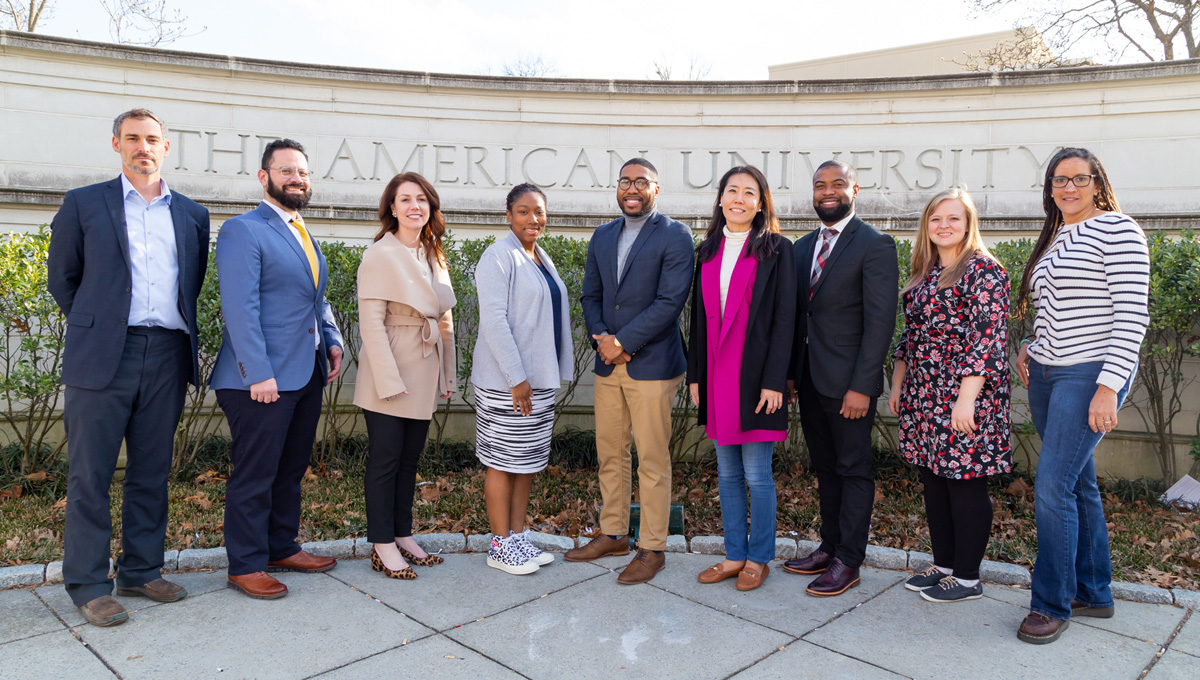
The second cohort of AU School of Education's Educational Doctor of Education in Education Policy and Leadership.
